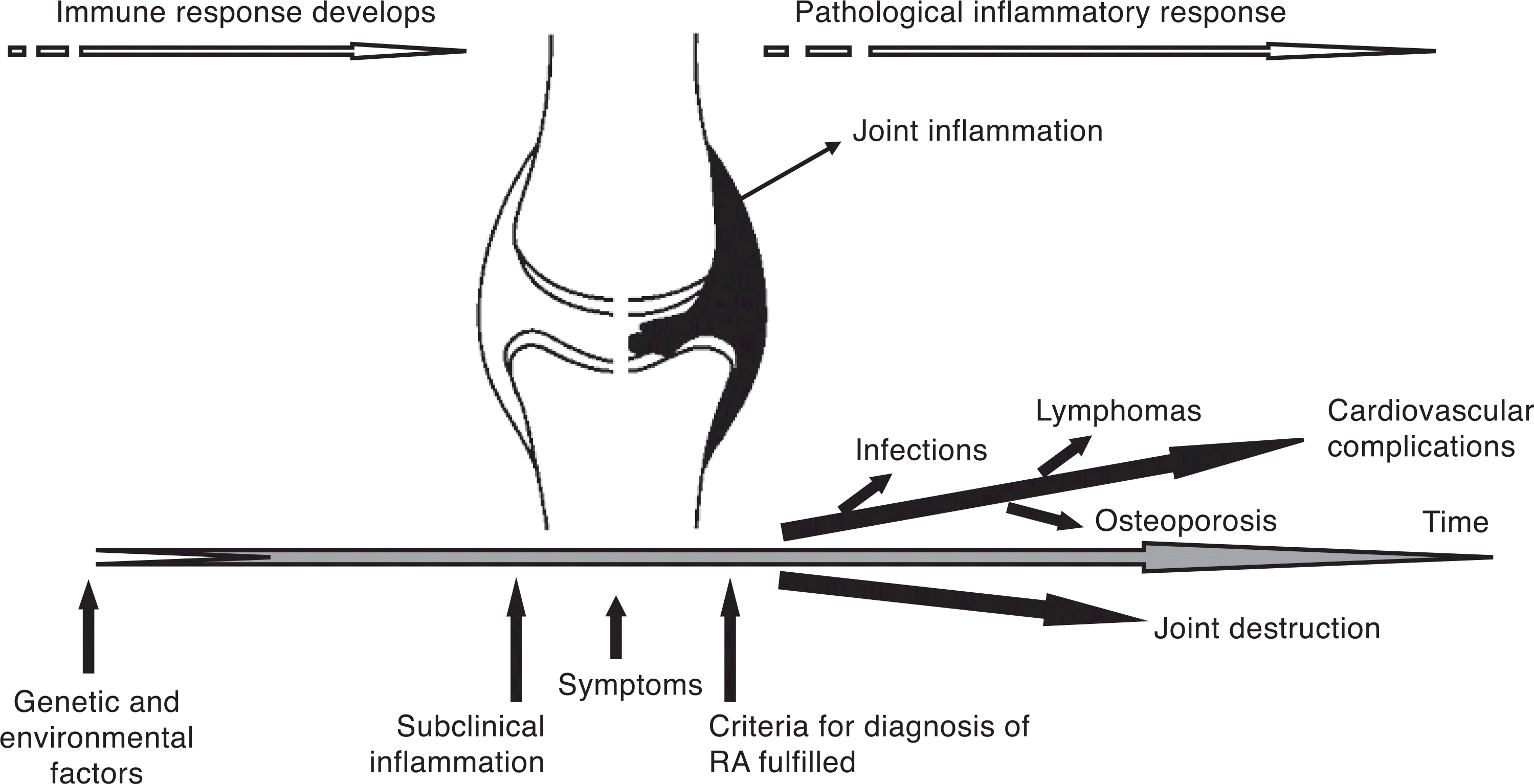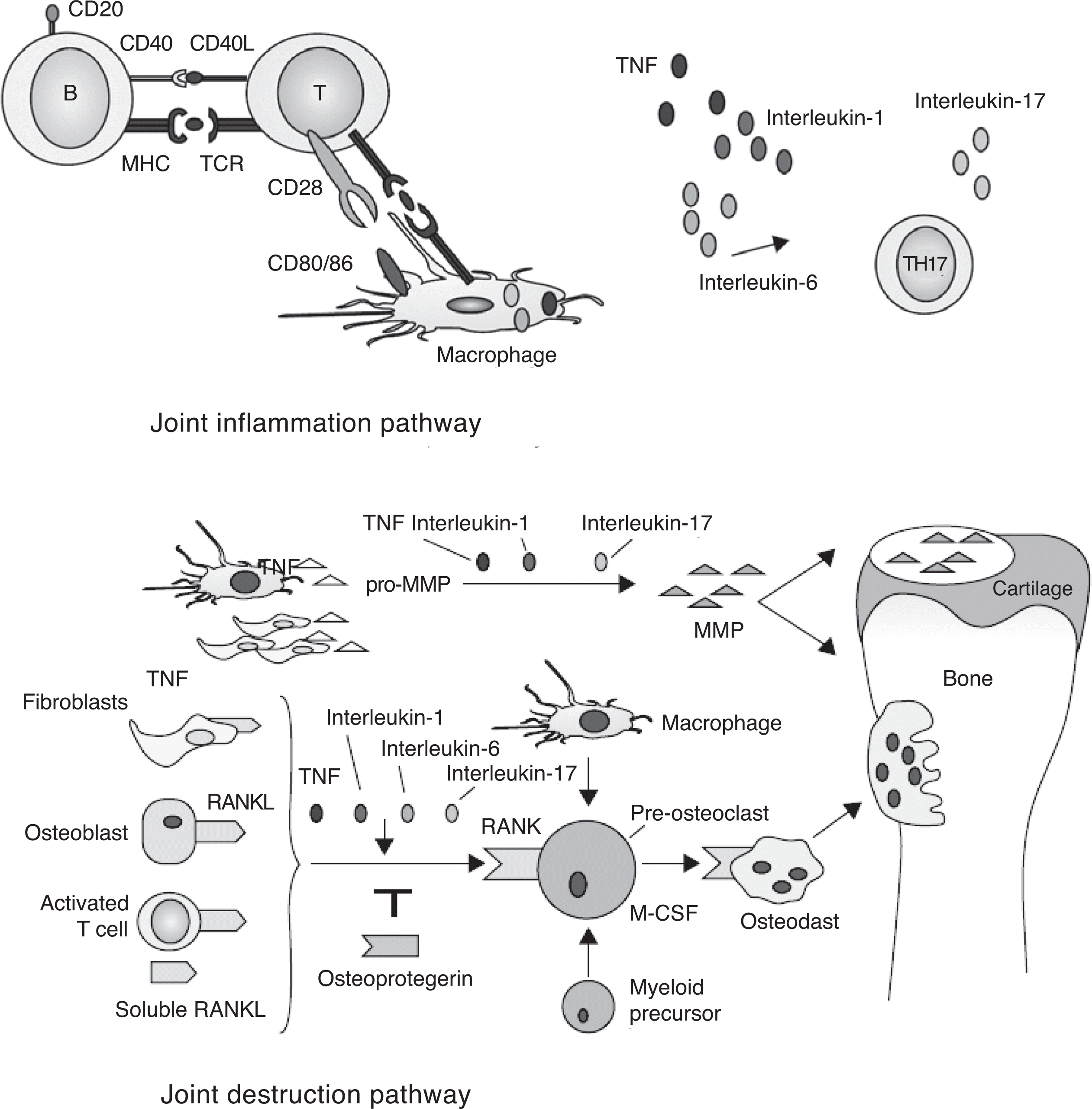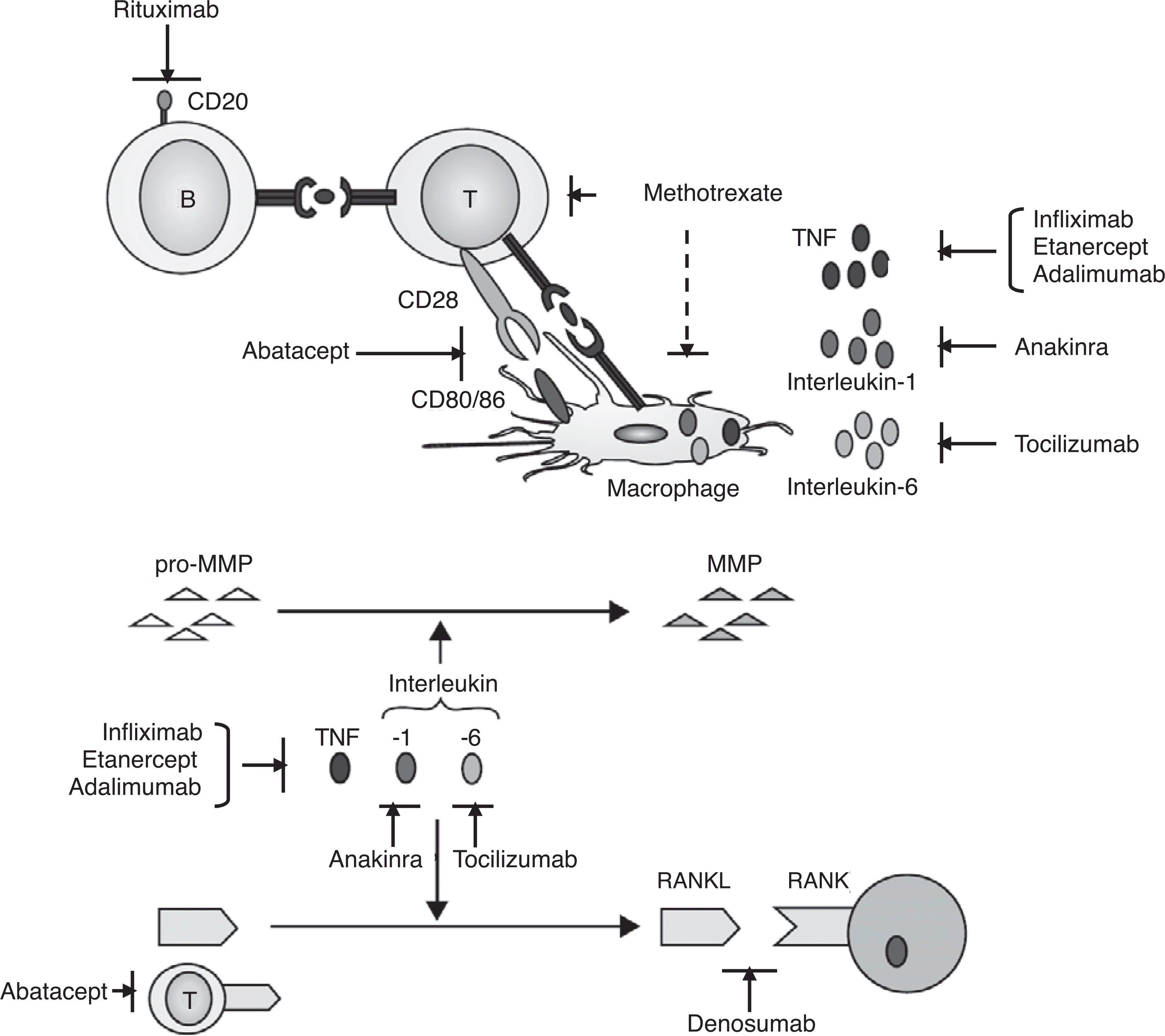Abstract
Rheumatoid arthritis is a systemic, inflammatory, autoimmune disorder of unknown origins. Enhanced understanding of molecular pathogenesis has enabled the development of new biologic treatment that focuses on selective parts of immune system. Combined genetic and environmental factors in association with the risk of rheumatoid arthritis have received increased attention. Research undertaken on the longitudinal disease process and molecular pathology of joint inflammation has contributed to the development of new therapeutic strategies that promote early use of disease-modifying anti-rheumatic drugs (DMARDs) with tight disease control and measurable treatment outcome. Such approach can be beneficial for control of inflammatory activity and joint destruction. We need to find out how to tailor the best individualized treatment in accordance with different cases.
References
1. Arnett FC, Edworthy SM, Bloch DA. The American Rheumatism Association 1987 revised criteria for the classification of rheumatoid arthritis. Arthritis Rheum. 1988; 31:315–324.

2. Lars K, Anca IC, Stephen P. Rheumatoid arthritis: Seminar. Lancet. 2009; 373:659–672.
3. Michaud K, Wolfe F. Comorbidities in rheumatoid arthritis. Best Pract Res Clin Rheumatol. 2007; 21:885–906.

4. Watts RA, Mooney J, Lane SE, Scott DG. Rheumatoid vasculitis: becoming extinct? Rheumatology (Oxford). 2004; 43:920–923.

5. De Rycke L, Peene I, Hoffman IE. Rheumatoid factor and anticitrullinated protein antibodies in rheumatoid arthritis: diagnostic value, associations with radiological progression rate, and extraarticular manifestations. Ann Rheum Dis. 2004; 63:1587–1593.

6. MacGregor AJ, Snieder H, Rigby AS. Characterizing the quantitative genetic contribution to rheumatoid arthritis using data from twins. Arthritis Rheum. 2000; 43:30–37.

7. lee AT, Li W, Liew A. The PTPN22 R620W polymorphism associates with RF positive rheumatoid arthritis in a dose-dependent manner but not with HLA-SE status. Genes Immun. 2005; 6:129–133.

8. Huizinga TW, Amos CI, van der Helm-van Mil AH. Refining the complex rheumatoid arthritis phenotype based on specificity of the HLA-DRB1 shared epitope for antibodies to citrullinated proteins. Arthritis Rheum. 2005; 52:3433–3438.

9. Kallberg H, Padyukov L, Plenge RM. Gene-gene and gene-environment interactions involving HLA-DRB1, PTPN22, and smoking in two subsets of rheumatoid arthritis. Am J Hum Genet. 2007; 80:867–875.
10. Brennan FM, Chantry D, Jackson A, Maini R, Feldmann M. Inhibitory effect of TNF alpha antibodies on synovial cell interleukin-1 production in rheumatoid arthritis. Lancet. 1989; 2:244–247.
11. Nishimoto N, Kishimoto T. Interleukin 6: from bench to bedside. Nat Clin Pract Rheumatol. 2006; 2:619–626.

12. Burger D, Dayer JM, Palmer G, Gabay C. Is IL-1 a good therapeutic target in the treatment of arthritis? Best Pract Res Clin Rheumatol. 2006; 20:879–896.

13. Edwards JC, Cambridge G, Abrahams VM. Do self-perpetuating B lymphocytes drive human autoimmune disease? Immunology. 1999; 97:188–196.

14. Horwood NJ, Kartsogiannis V, Quinn JM, Romas E, Martin TJ, Gillespie MT. Activated T lymphocytes support osteoclast formation in vitro. Biochem Biophys Res Commun. 1999; 265:144–150.

15. Gravallese EM, Manning C, Tsay A. Synovial tissue in rheumatoid arthritis is a source of osteoclast differentiation factor. Arthritis Rheum. 2000; 43:250–258.

16. Choy EH, Panayi GS. Cytokine pathways and joint inflammation in rheumatoid arthritis. N Engl J Med. 2001; 344:907–916.

17. Ek M, Engblom D, Saha S, Blomqvist A, Jakobsson PJ, Ericsson-Dahlstrand A. Inflammatory response: pathway across the blood-brain barrier. Nature. 2001; 410:430–431.
18. Moreland LW, Genovese MC, Sato R, Singh A. Effect of etanercept on fatigue in patients with recent or established rheumatoid arthritis. Arthritis Rheum. 2006; 55:287–293.

19. Plant MJ, Jones PW, Saklatvala J, Ollier WE, Dawes PT. Patterns of radiological progression in early rheumatoid arthritis: results of an 8 year prospective study. J Rheumatol. 1998; 25:417–426.
20. Redlich K, Hayer S, Ricci R. Osteoclasts are essential for TNF-alpha-mediated joint destruction. J Clin Invest. 2002; 110:1419–1427.
21. Jarrett SJ, Conaghan PG, Sloan VS. Preliminary evidence for a structural benefit of the new bisphosphonate zoledronic acid in early rheumatoid arthritis. Arthritis Rheum. 2006; 54:1410–1414.

22. Rengel Y, Ospelt C, Gay S. Proteinases in the joint: clinical relevance of proteinases in joint destruction. Arthritis Res Ther. 2007; 9:221.

23. Cohen SB, Dore RK, Lane NE. Denosumab treatment effects on structural damage, bone mineral density, and bone turnover in rheumatoid arthritis: a twelve-month, multicenter, randomized, double-blind, placebo-controlled, phase II clinical trial. arthritis Rheum. 2008; 58:1299–1309.

24. Pincus T, Callahan LF. Taking mortality in rheumatoid arthritis seriously: predictive markers, socioeconomic status and comorbidity. J Rheumatol. 1986; 13:841–845.
25. Wallberg-Jonsson S, Johansson H, Ohman ML, Rantapaa-Dahlqvist S. Extent of inflammation predicts cardiovascular disease and overall mortality in seropositive rheumatoid arthritis: a retrospective cohort study from disease onset. J Rheumatol. 1999; 26:2562–2571.
26. Maradit-Kremers H, Crowson CS, Nicola PJ. Increased unrecognized coronary heart disease and sudden deaths in rheumatoid arthritis: a population-based cohort study. Arthritis Rheum. 2005; 52:402–411.

27. Freeston JE, Conaghan PG, Dass S. Dose extremity-MRI improve erosion detection in severely damaged joints? A study of long-standing rheumatoid arthritis using three imaging modalities. Ann Rheum Dis. 2007; 66:1538–1540.
28. Szkudlarek M, Narvestad E, Klarlund M, Court-Payen M, Thomsen HS, Ostergaard M. Ultrasonography of the meta-tarsophalageal joints in rheumatoid arthritis: comparison with magnetic resonance imaging, conventional radiography, and clinical examination. Arthritis Rheum. 2004; 50:2103–2112.
29. O'Dell JR, Haire CE, Erikson N. Treatment of rheumatoid arthritis with methotrexate alone, sulfasalazine and hydroxychloroquine, or a combination of all three medications. N Engl J Med. 1996; 334:1287–1291.
30. Svensson B, Boonen A, Albertsson K, van der Heijde D, Keller C, Hafstrom I. Low-dose prednisolone in addition to the initial disease-modifying antirheumatic drug in patients with early active rheumatoid arthritis reduces joint destruction and increases the remission rate: a two year randomized trial. Arthritis Rheum. 2005; 52:3360–3370.
31. Smolen JS, Beaulieu A, Rubbert-Roth A. Effect of interleukin-6 receptor inhibitor with tocilizumab in patients with rheumatoid arthritis (OPTION study): a double-blind, placebo-controlled, randomized trial. Lancet. 2008; 371:987–997.
32. Kremer JM, Westhovens R, Leon M. Treatment of rheumatoid arthritis by selective inhibition of T-cell activation with fusion protein CTLA4Ig. N Engl J Med. 2003; 349:1907–1915.

33. Edwards JC, Szczepanski L, Szechinski J. Efficacy of B-cell-targeted therapy with rituximab in patients with rheumatoid arthritis. N Engl J Med. 2004; 350:2572–2581.

34. Wijbrandts CA, Dijkgraaf MG, Kraan MC. The clinical response to infliximab in rheumatoid arthritis is in part dependent on pre-treatment TNF? expression in the synovium. Ann Rheum Dis. 2008; 67:1139–1144.
35. Teng YK, Levarht EW, Hashemi M. Immunohistochemical analysis as a mean to predict responsiveness to rituximab treatment. Arthritis Rheum. 2007; 56:3909–3918.
Table 1.
ACR criteria for rheumatoid arthritis




 PDF
PDF ePub
ePub Citation
Citation Print
Print





 XML Download
XML Download